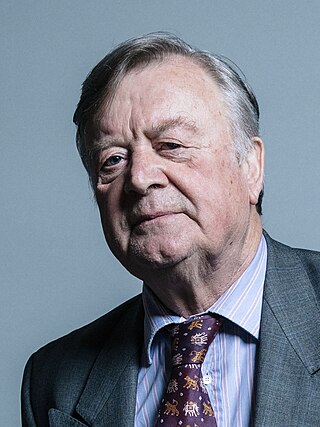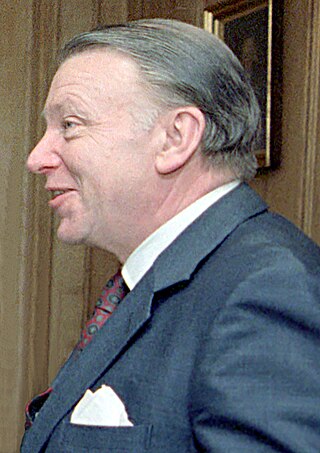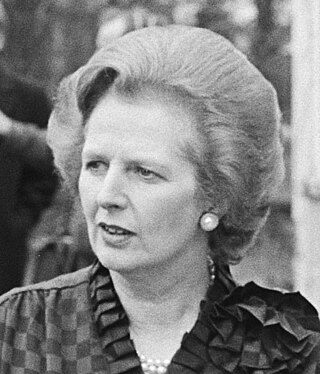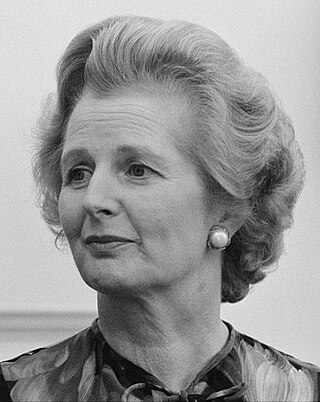
Michael Ray Dibdin Heseltine, Baron Heseltine, is a British politician. Having begun his career as a property developer, he became one of the founders of the publishing house Haymarket. Heseltine served as a Conservative Member of Parliament from 1966 to 2001. He was a prominent figure in the governments of Margaret Thatcher and John Major, and served as Deputy Prime Minister and First Secretary of State under Major.

Norman Beresford Tebbit, Baron Tebbit is a British politician. A member of the Conservative Party, he served in the Cabinet from 1981 to 1987 as Secretary of State for Employment (1981–1983), Secretary of State for Trade and Industry (1983–1985), and Chancellor of the Duchy of Lancaster and Chairman of the Conservative Party (1985–1987). He was a Member of Parliament (MP) from 1970 to 1992, representing the constituencies of Epping (1970–1974) and Chingford (1974–1992).

Kenneth Harry Clarke, Baron Clarke of Nottingham,, is a British politician who served as Home Secretary from 1992 to 1993 and Chancellor of the Exchequer from 1993 to 1997. A member of the Conservative Party, he was Member of Parliament (MP) for Rushcliffe from 1970 to 2019 and was Father of the House of Commons between 2017 and 2019. The President of the Tory Reform Group since 1997, he is a one-nation conservative who identifies with economically and socially liberal views.

The secretary of state for defence is a secretary of state in the Government of the United Kingdom, with responsibility for the Ministry of Defence. As a senior minister, the incumbent is a member of the Cabinet of the United Kingdom.

The Westland affair in 1985–86 was an episode in which Margaret Thatcher, Prime Minister of the United Kingdom, and her Secretary of State for Defence, Michael Heseltine, went public over a cabinet dispute with questions raised about whether the conventions of cabinet government were being observed and about the integrity of senior politicians.

Francis Leslie Pym, Baron Pym, was a British Conservative Party politician who served in various Cabinet positions in the 1970s and 1980s, including Foreign, Defence and Northern Ireland Secretary, and Leader of the House of Commons. He was Member of Parliament (MP) for Cambridgeshire from 1961 to 1987. Pym was made a life peer in 1987.

Hugo George William Swire, Baron Swire, is a British politician. He served as the Member of Parliament (MP) for East Devon from 2001 until 2019. A member of the Conservative Party, he has had several ministerial roles, most recently as Minister of State for Europe and the Americas, a role he held until July 2016. Swire is currently the Deputy Chairman of the Commonwealth Enterprise and Investment Council. He retired from the House of Commons at the 2019 general election. Since 2022 he has been a member of the House of Lords.
Sir Cyril David Townsend was a British politician.

Sir Herbert Keith Speed was a British Conservative politician and former Member of Parliament. He was a descendant of cartographer and historian John Speed.

The Falklands Play is a dramatic account of the political events leading up to, and including, the 1982 Falklands War. The play was written by Ian Curteis, an experienced writer who had started his television career in drama, but had increasingly come to specialise in dramatic reconstructions of history. It was originally commissioned by the BBC in 1983, for production and broadcast in 1986, but was subsequently shelved by Controller of BBC One Michael Grade due to its pro-Margaret Thatcher stance and alleged jingoistic tone. This prompted a press furore over media bias and censorship. The play was not staged until 2002, when it was broadcast in separate adaptations on BBC Television and Radio. It was aired again on BBC4, 1 December 2020, over 18 years after it was last transmitted.
The Alan Clark Diaries is a 2004 BBC television serial dramatising the diaries of the controversial British Conservative politician Alan Clark. The six-episode series debuted on BBC Four on 15 January 2004, and was later repeated on BBC Two.

Margaret Thatcher was Prime Minister of the United Kingdom from 4 May 1979 to 28 November 1990, during which time she led a Conservative majority government. She was the first woman to hold that office. During her premiership, Thatcher moved to liberalise the British economy through deregulation, privatisation, and the promotion of entrepreneurialism.

Margaret Thatcher was Prime Minister of the United Kingdom from 4 May 1979 to 28 November 1990, during which time she led a Conservative majority government. She was the first woman to hold that office. During her premiership, Thatcher moved to liberalise the British economy through deregulation, privatisation, and the promotion of entrepreneurialism.

The Iron Lady is a 2011 biographical drama film based on the life and career of Margaret Thatcher, a British politician who was the longest-serving Prime Minister of the United Kingdom of the 20th century and the first woman to hold the office. The film was directed by Phyllida Lloyd and written by Abi Morgan. Thatcher is portrayed primarily by Meryl Streep, and, in her formative and early political years, by Alexandra Roach. Thatcher's husband, Denis Thatcher, is portrayed by Jim Broadbent, and by Harry Lloyd as the younger Denis. Thatcher's longest-serving cabinet member and eventual deputy, Geoffrey Howe, is portrayed by Anthony Head.
The 1981 Defence White Paper was a major review of the United Kingdom's defence policy brought about by the Conservative government under the Prime Minister Margaret Thatcher. The main author was the then Secretary of State for Defence, John Nott. The aim of the review was to reduce expenditure during the early 1980s recession and to focus on supporting NATO rather than out of area operations. It was ultimately judged however to have been extremely detrimental to the Defence of the Realm, being among other things widely considered to have been one of the contributing factors that led to the outbreak of the Falklands War.

Margaret Thatcher became the first female Leader of the Conservative Party and Leader of the Opposition after winning the 1975 leadership election, the first Conservative leadership election where the post was not vacant. A rule change to enable the election was largely prompted by dissatisfaction with the incumbent leader, Edward Heath, who had lost three of four general elections as leader, including two in 1974. After announcing her first Shadow Cabinet in February 1975, she reshuffled it twice: in January and November 1976. Minor subsequent changes were necessary to respond to various circumstances. Thatcher's Shadow Cabinet ceased to exist upon her becoming Prime Minister following the 1979 general election.
Philip Pedley is a British Conservative activist who held a number of positions in the Conservative Party at local, regional and national level and was appointed Deputy Chairman of one of the largest quangos in Wales. He was educated at Calday Grange Grammar School and Lancaster University.
Miloška Nott, Lady Nott, is a British-Slovenian charity fundraiser.
Alexandra Patrusha Mina Swire, Baroness Swire, commonly known as Sasha Swire, is an English author and journalist, and the wife of the former Conservative Party Minister of State Hugo Swire, Baron Swire.















